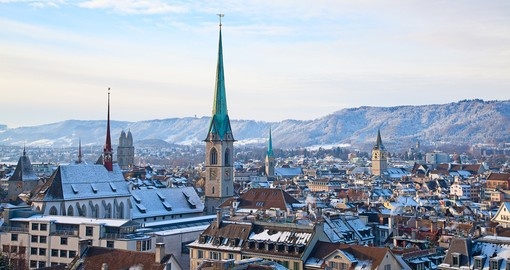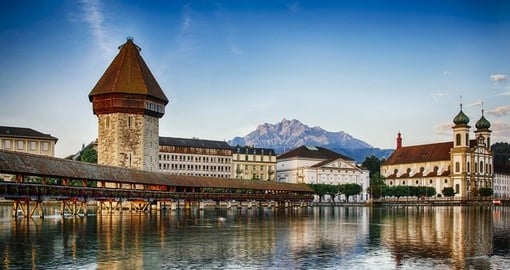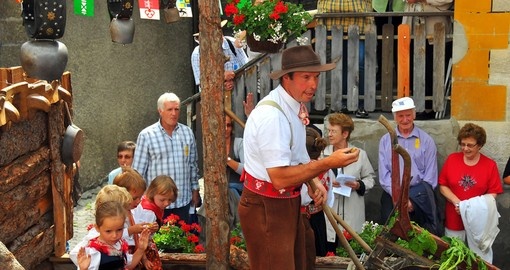Switzerland History
Celtic tribes known as Helveticans were some of the first known inhabitants of Switzerland. Julius Caesar and his Roman armies invaded the area and by 58 BC, present-day Switzerland was under Roman control. It wasn’t until 400 AD that another invasion came to the country in the form of the Germanic Alemanni tribe. They were successful in driving the Romans out of Switzerland. The Burgundians, a fellow Germanic tribe came later, settling in the west.
In the 6th century, the Franks came to Switzerland, conquering both the Alemanni and the Burgundians. The tribes were torn apart once again in the 9th century when Charlemagne’s empire was partitioned. The groups would not be united until 1032 when the area became part of the Pan-European Holy Roman Empire.
Despite being under the Holy Roman Empire, the people of Switzerland were generally left to their own devices, a system that they naturally enjoyed. This changed in 1273 when Rudolph I, a Hapsburg ruler became the Holy Roman Emperor and sent men into Switzerland to collect taxes. Rudolph I’s goal was to tighten the administrative control he had over the country leaving the population angry and resentful.
Frustrated under Rudolph’s rule, the Swiss were quick to mobilize towards independence upon Rudolph’s death in 1291. They called themselves the Swiss Confederation, however, not everyone was happy with this decision. In 1315, Duke Leopold sent Austrian armies into Switzerland in an attempt to quash the growing Swiss nationalism. While Leopold was successful in defeating the Swiss, it was not the outcome he wanted. Frustrated once more by threats to their independence, the defeat at the hands of Leopold only encouraged more groups to join the Swiss Confederation. For the next 200 years, the Swiss faced many military attacks yet they remained persistent. They were finally granted independence from Holy Roman Emperor Maximilian in 1499.
The Swiss, now famous for their neutrality, began this tradition as far back as the 17th century. The Thirty Years' War was the result of the Protestant Reformation and the Catholic Counter-Reformation. It was a brutal war, it was incredibly destructive to Central Europe. Unable to choose between the Catholic and Protestant sides, Switzerland declared itself neutral.
In 1798, the French invaded Switzerland. This resulted in a great deal of internal fighting that forced Napoleon to bring back the confederations of cantons (administrative subdivisions) in 1805. When Napoleon was defeated in 1815, the Congress of Vienna guaranteed Swiss independence and neutrality.
Civil war broke out in Switzerland in 1847 between the Protestant army and Catholic cantons. While the war only lasted for 26 days, it did bring in a new federal constitution and the city of Bern was named as the capital. Things began to take off in Switzerland in the second half of the 19th century. Railways and roads were constructed, skilled labourers formed guilds, and tourism was heavily promoted. In 1863, Henri Dunant founded the International Red Cross in Geneva.
When the First World War struck Europe, the Swiss maintained their neutrality, only contributing to Red Cross units. Following the war, they joined the League of Nations but without military involvement. A general strike in 1918 helped establish the progressive social state that Switzerland is famous for to this day.
The Swiss were not involved in the Second World War, and as such, they were able to remain stable in the aftermath. Zurich established itself as an international banking centre and Geneva became an important spot for many international organizations such as the World Health Organization. Initially prohibited from joining the UN because of its neutrality, Switzerland became the 190th member of the UN in 2002.
Switzerland Travel Information
At Goway we believe that a well-informed traveller is a safer traveller. With this in mind, we have compiled an easy-to-navigate travel information section dedicated to Switzerland.
Learn about the history and culture of Switzerland, the must-try food and drink, and what to pack in your suitcase. Read about Switzerland's nature and wildlife, weather and geography, and 'Country Quickfacts' compiled by our travel experts. Our globetrotting tips, as well as our visa and health information, will help ensure you're properly prepared for a safe and enjoyable trip. The only way you could possibly learn more is by embarking on your journey and discovering Switzerland for yourself. Start exploring… book one of our Switzerland tours today!
Get a Trip Quote Order a Brochure




















